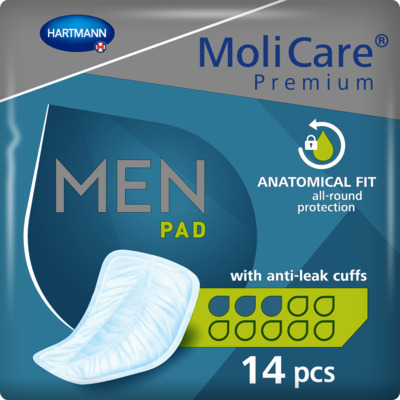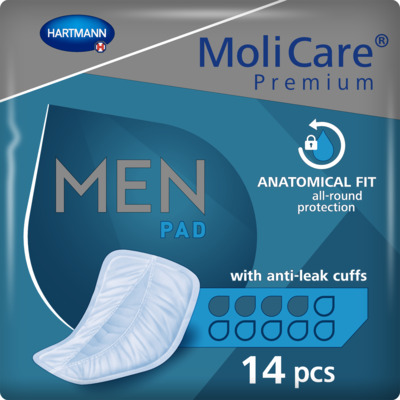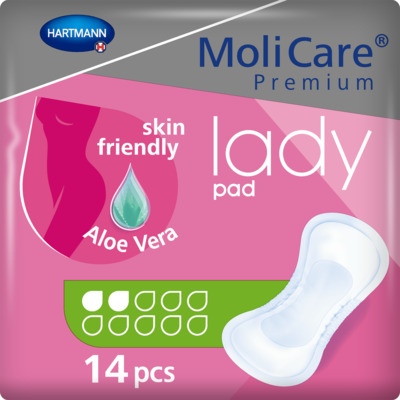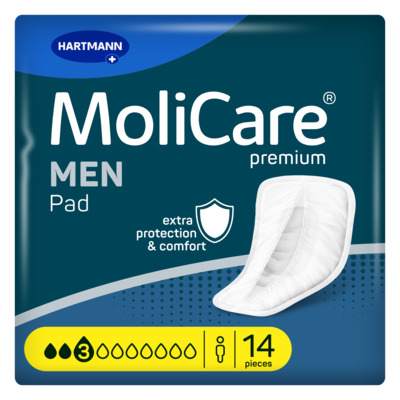Active living
Caffeine and incontinence: Does coffee make you pee more?
Do you rely on caffeine too much to keep you awake in the mornings, only to find yourself rushing to the toilet shortly after? Learn about the connection between caffeine and incontinence here. Many people rely on caffeine to wake themselves up in the morning and propel them into the working day, but this can lead to many questions, such as, does coffee make you pee more? In this article, you will learn about the correlation between caffeine and incontinence and discover how beverages such as coffee, tea and other energy drinks can be classified as drinks that irritate the bladder.

Key points:
Understand why caffeine might increase your need to urinate and contribute to incontinence.
Discover the diuretic properties of caffeine and how it affects the bladder.
Learn about the potential bladder irritation from caffeine and ways to mitigate it.
Explore practical steps to reduce caffeine consumption.
Understanding caffeine
Caffeinated beverages such as coffee, tea, and energy drinks are staples in diets around the world, particularly in Western cultures. With billions of cups consumed annually, caffeine is often a ritual for many. When was the last time you went on a coffee date?
However, the widespread consumption of these drinks raises questions about their health impacts, especially regarding urinary health and caffeine-related incontinence.
Caffeine is a natural stimulant found in various plants. It alleviates drowsiness and boosts alertness by blocking certain neurotransmitters in the brain. It's well-known for its ability to quicken reaction times and help us stay awake.
On average, 80% of Brits visit a coffee shop, whether it's a Starbucks, Costa or local cafe, at least once a week and purchase a caffeinated drink as part of their daily routine. This high consumption level leads us to assume that many people could be feeling the effects of caffeine on their bladder due to the diuretic effects of caffeine.
Why does caffeine make you pee more?
Caffeine can affect the bladder due to its diuretic properties, which increase urine production by affecting how water is reabsorbed in the kidneys. This means more frequent trips to the bathroom, which is a notable concern for anyone with bladder sensitivity, urinary retention, or incontinence.
So, does caffeine irritate the bladder? Yes, it does.
Besides increasing urine volume, caffeine can irritate the bladder lining and pelvic floor muscles, leading to a greater sense of urgency and frequency. These effects might explain why caffeine makes you pee more often, particularly if your bladder is already prone to conditions such as urge and stress incontinence.
For those with sensitive or weak bladders, the decision to reduce or eliminate caffeine intake is important, and, for some people, simply switching to decaffeinated coffee can prevent bladder irritation.
The correlation between caffeine and urinary tract infections
The diuretic effects of caffeine can exacerbate urinary tract infections as well as dehydration. Dehydration reduces the body's ability to flush out pathogens, increasing the risk of infections. Since caffeine causes frequent urination without increasing hydration, it can create conditions where urinary tract infections can develop.

Reducing your coffee intake
Reducing caffeine can be challenging and can lead to withdrawal symptoms, such as headaches and fatigue.
A gradual approach, known as caffeine fading, can be effective. This involves reducing your intake slowly, say by ½ cup per day, while substituting with bladder friendly drinks like water, herbal teas, or milk. This not only eases the symptoms of withdrawal but also maintains hydration, which is beneficial for bladder health.
Should you reduce your coffee intake?
While you don’t have to cut out caffeine completely, for those dealing with caffeine-induced incontinence, it is advisable to decrease your daily intake. As stated, caffeine can irritate the bladder and potentially lead to urinary incontinence, including overactive bladders.
But how much caffeine is okay?
Knowing how much caffeine is in your cup of coffee can be helpful. For example, a regularly brewed coffee contains around 150-200mg of caffeine, which can significantly impact bladder functioning.
For those with bladder sensitivity or incontinence issues, less is more. Ideally, minimising caffeine to zero would be best, but for many, a small amount – such as less than 8oz of coffee daily – may be manageable.
Here’s a list of caffeine content in some common foods and drinks:
Black tea (8 oz cup): 50 mg
Brewed coffee (8 oz cup): 150-200 mg
Instant coffee (1 teaspoon): 60-80 mg
Espresso (1.5 oz cup): 150-200 mg
Cola (12 fl oz can): 50 mg
Energy drink (8 oz can): 80-100 mg
Dark chocolate (1.7 oz bar): 60 mg
Milk chocolate (1.7 oz bar): 10 mg
Alternatives to coffee
If reducing your caffeine intake leaves you feeling less alert and you need something to replace it, consider natural alternatives for an energy boost.
Additionally, incorporating aerobic exercises into your daily routine can invigorate your body naturally, increasing blood flow and energy levels without the adverse effects on your bladder.
Staying hydrated with plenty of water throughout the day will aid in flushing out any unwanted toxins in your body quicker, especially if you consume any caffeine. This helps mitigate the dehydrating effects of caffeine and supports overall urinary tract health.
If you are considerably impacted by reduced energy levels, it is a good idea to discuss this with a healthcare professional who may carry out some tests to determine if there are any underlying causes. If a deficiency is found, they may advise some vitamin supplements, such as Vitamin B12 , which is essential for general bodily functioning, energy and mental clarity.

Is decaf better?
The popularity of decaffeinated coffee has soared - and with good reason.
Many coffee lovers find that decaf offers the same rich flavours and comforting warmth without the side effects associated with caffeine. This makes it an excellent choice for those managing caffeine sensitivity or urinary incontinence.
Decaf coffee provides all the enjoyment of your favourite brew without the diuretic effect, reducing the frequency and urgency of urination. This is particularly beneficial for those with an overactive bladder, as it minimises the risk of accidental leaks.
Unlike caffeinated drinks, decaf does not irritate the bladder lining or increase the likelihood of bladder spasms. This can lead to a more stable and controllable bladder environment, reducing incidents of urgency and incontinence.
However, be aware that decaf coffee can still cause bladder irritation, though it generally has a milder effect compared to regular coffee. Here’s why:
Acidity: Decaf coffee retains some of the acidity found in regular coffee. Acidic beverages can irritate the bladder lining and exacerbate bladder sensitivity in some individuals.
Caffeine residue: While decaf coffee has significantly less caffeine than regular coffee, it is not completely caffeine-free. Even small amounts of caffeine can contribute to bladder irritation in sensitive individuals.
Individual sensitivity: People have varying levels of sensitivity to coffee and its components. Some may find that decaf still triggers symptoms of bladder irritation or urgency.
If you experience bladder discomfort or irritation from decaf coffee, it may be helpful to try other low-acid beverages or consult with a healthcare provider to identify alternatives that are less likely to irritate your bladder.

Can caffeine affect sleep?
Caffeine is a known sleep disruptor, often causing frequent nighttime trips to the bathroom, and can last anytime between 2-12 hours. Switching to decaf can help improve your sleep quality by eliminating caffeine-induced wakefulness and reducing nighttime urination, allowing for uninterrupted rest.
Tailoring solutions with HARTMANN Direct UK
At HARTMANN Direct UK, we understand the challenges faced by those living with bladder sensitivity and incontinence. That's why we offer a range of incontinence products designed to provide comfort, confidence, and control. From protective pads and pants to skin care products that help prevent irritation, our solutions are tailored to meet your needs. Incorporating decaffeinated drinks into your routine alongside using MoliCare’s® discreet and reliable products can significantly improve your quality of life, ensuring you remain active and reassured, no matter the occasion.
By reducing caffeine intake through decaf alternatives, you can achieve better bladder control. This boost in confidence can be especially empowering during the colder months filled with social events and activities.
Further reading:
Like what you see? Explore our other active living articles from our advice centre and see how you can improve your lifestyle:
Bladder cleansing foods - to eat on the daily and improve bladder and bowel health.
How many times a day should you wee? - common questions and myths debunked.
Incontinence when exercising - is it possible? Read more to find out.

FAQs
Can caffeine cause urinary incontinence?
Yes, caffeine can irritate the bladder and act as a diuretic, increasing the risk of urinary incontinence, especially in people with a sensitive bladder.
Can your bladder be sensitive to caffeine?
Yes, some people have a bladder that is sensitive to caffeine, which can lead to increased urgency, frequency and potential incontinence.
Does quitting caffeine help an overactive bladder?
Yes, quitting or reducing caffeine intake can help alleviate symptoms of an overactive bladder by reducing bladder irritation and urgency.
Sources
Bellis, J., (2024) Coffee Consumption Statistics (Simple Stats for Journalists) Balance Coffee. [online] Available at: https://balancecoffee.co.uk/blogs/blog/global-coffee-consumption-statistics [accessed 04/09/24]
Van De Wall, G., (2020) What Is a Caffeine Crash? Plus 4 Tips for How to Avoid It. Healthline. [online] Available at: https://www.healthline.com/nutrition/caffeine-crash [accessed 04/09/24]
Whitbourne, K., (2024) Vitamin B12: What to Know. Web MD. [online] Available at: https://www.webmd.com/diet/vitamin-b12-deficiency-symptoms-causes [accessed 04/09/24]
Newsom, R., Rehman, A., Dr. (2024) How Long Does It Take for Caffeine to Wear Off? Sleep Foundation. [online] Available at: https://www.sleepfoundation.org/nutrition/how-long-does-it-take-caffeine-to-wear-off [accessed 04/09/24]

MoliCare® Premium Men Pad 3 Drops
<h2>Suitable for men with bladder weakness</h2> <p>Suitable for men of all age groups, body shapes and sizes, it truly is a one size fits all with this range. It is never pleasant to go about daily activities with the potential risk of an incontinence slip, MoliCare® have created the Premium Men Pad 3 drops, designed with a V-Shape to comfortably fit around the desired area, and has a textile-like back sheet for extra protection.</p> <p>To make sure that you choose a premium men pad that is right for you, check out the additional features of this product range:</p> <h2>Leakage protection for men you can rely on</h2> <p>With a body-shaped design, these absorbent mens pads offer reliable protection for men with light bladder weakness. The soft, cotton-like materials ensure discreet comfort, and the odour neutraliser keeps you feeling fresh and confident.</p> <h2>Secure fit and skin-friendly</h2> <p>The Premium MEN Pads feature a wide adhesive strip for secure fixation in your regular underwear, providing you with peace of mind during your daily activities. The soft and breathable materials are gentle on your skin, maintaining its health with a skin-friendly pH.</p> <h2>All-round protection for men</h2> <p>MoliCare® Premium MEN Pads are equipped with a quick dry system, anti-leakage system, and cuffs for added security, ensuring all-round protection you can trust. Dermatologically tested, these pads are safe and reliable for daily use.</p> <h2>Tailored for your needs</h2> <p>Available in different absorbency levels, MoliCare® incontinence products for men cater to varying degrees of incontinence, providing you with the level of care that suits your needs. MoliCare® Premium MEN Pads are perfect for daily wear or when you need extra protection against slight to moderate incontinence. Discreet and comfortable, they enable you to maintain your active lifestyle with confidence.</p> <h2>Fast and reliable delivery</h2> <p>Our quick ordering service makes it easy to get the incontinence products you need. Additionally, our price match promise ensures you get both quality and value for money.</p> <p>Enjoy fast delivery on all orders over £50 when you purchase from HARTMANN Direct.</p>
MoliCare® Premium Men Pad 4 Drops
<h2>Comfortable and absorbent</h2> <p>Why MoliCare for men? Hers are some of the key features of the MoliCare® Premium Men Pads from Hartmann:</p> <ul> <li>Discreet and comfortable</li> <li>Fits the male physique</li> <li>3-layer absorbent core</li> <li>Fast-absorbing system</li> <li>Anti-leakage cuffs</li> <li>Odour neutralisers</li> <li>Wide adhesive strip</li> <li>Skin-friendly</li> </ul> <p>With an affordable price and great quality guarantee, you cannot regret choosing MoliCare® Premium Men Pad 4 drops, equipped with anti-leak cuffs, and 14 pieces per bag.</p> <h2>Slim and discreet under clothing</h2> <p>MoliCare® Premium MEN Pads offer reliable support for men dealing with bladder weakness. Whether it's stress incontinence or urge incontinence, these pads for men are designed to provide a discreet and quick solution on the go. Simply place the pad before applying your underwear and secure it with the adhesive strip for worry-free protection. MoliCare® Premium MEN Pads offer full coverage for men facing very light to moderate bladder weakness.</p> <h2>Leakage protection for men</h2> <p>MoliCare® understands that each individual's incontinence needs are unique. That's why our incontinence products, including MoliCare® Premium MEN Pads, are available in different absorbency levels. You can find the perfect fit and protection for your specific requirements.</p> <h2>Reliable and soft on the skin</h2> <p>Our body-shaped absorbent pads are designed to deliver dependable and skin-friendly incontinence protection every day. Experience discreet comfort with the soft, cotton-like materials and the added benefit of an odour neutraliser, ensuring you feel fresh and confident throughout the day.</p> <h2>Fast delivery to your home</h2> <p>At HARTMANN Direct, we ensure a fast delivery service for all our products. Enjoy free delivery on orders over £50, making it convenient and hassle-free to receive the incontinence products you need. Our dedicated customer care team is here to discuss your incontinence product needs and answer any questions you may have. Call us today on 0800 028 9470 to experience the comfort and confidence that MoliCare® Premium MEN Pads can provide.</p>
MoliCare® Premium Lady Pad 2 Drops
<h2>Skin Friendly Pant Liners</h2> <p>For women that experience slight incontinence and bladder weakness, across different age groups, it can be a challenge to find the right bladder weakness product that is easy to apply and wear without the worry of potential leakages. Fortunately, we understand this approach, hence why we are happy to offer our MoliCare® Premium Lady Pad 2 drops, that is skin-friendly, Aloe Vera applied, and comes with 14 liners per bag.</p> <h2>Slim and discreet liners</h2> <p>Whether dealing with stress incontinence or urge incontinence, these panty liners offer a discreet and easy solution on the go. Simply place the pad in your underwear and secure it with the adhesive strip for all-round protection. Available in different absorbency levels, MoliCare® bladder weakness products cater to all levels of bladder weakness, ensuring secure care.</p> <h2>Control Bladder Weakness</h2> <p>Enjoy the benefits of these body-shaped absorbent panty liners, designed for women with bladder weakness. The pads offer discreet, reliable protection with features including odour control and fast absorption.</p> <p>With a wide adhesive strip, you can comfortably fix the pad in your regular underwear, providing secure and comfortable fixation. The pads are skin-friendly, featuring soft, breathable materials, including foam cuffs, and a top sheet treated with Aloe Vera.</p> <p>Keeping your skin healthy is a priority, which is why MoliCare® Premium Lady Pads have a skin-neutral pH value of 5.5 and an antibacterial finish. They are also dermatologically tested, offering peace of mind.</p> <h2>Buy pant liners online</h2> <p>Never worry about running out with our convenient order service and fast delivery direct to your door. Enjoy free shipping on orders over £50.</p> <p>If you need assistance, our professional customer service team is here to support you in choosing the right product. Reach out to us today at 0800 028 9470 and experience the comfort and reliability of MoliCare® Premium Lady Pads.</p>
